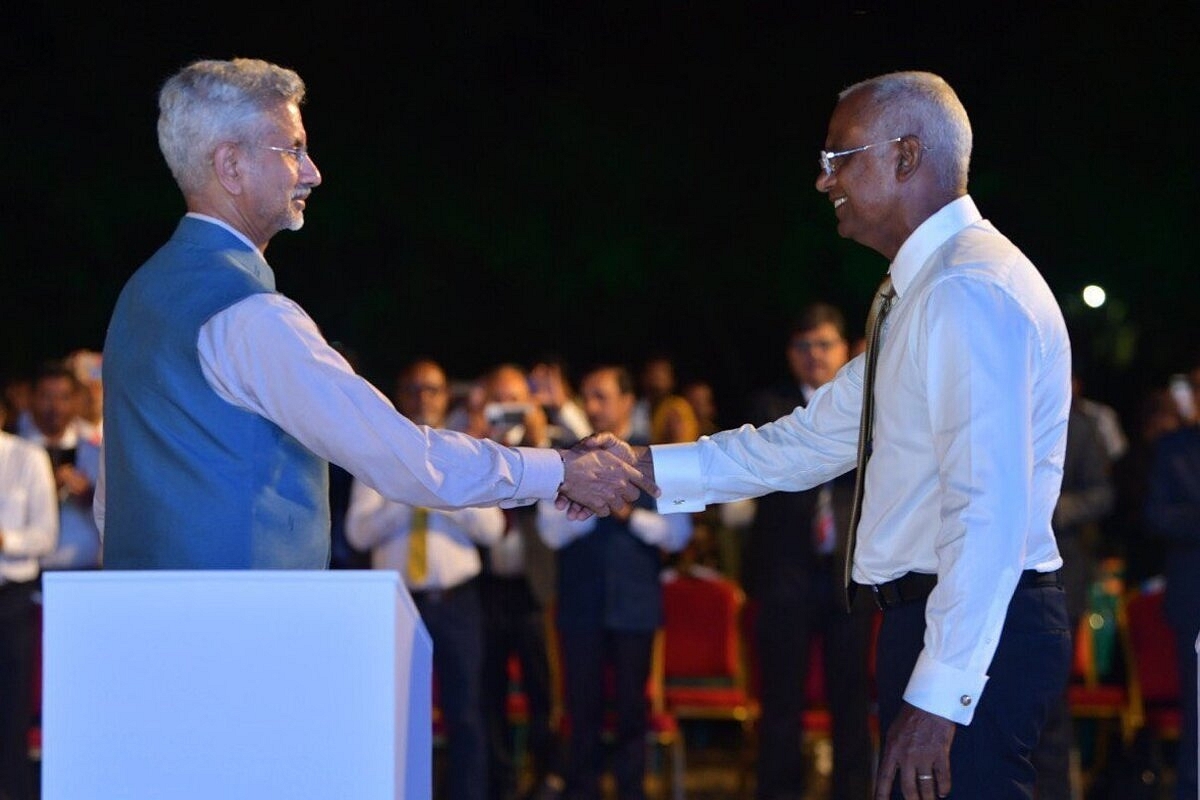Defence
Maldives: India Takes Another Step To Boot Out Chinese Influence From Neighbourhood With New Defence Agreement

External Affairs Minister S Jaishankar with Maldives President Ibrahim Mohamed Solih.
In an another step booting China out from the Indian Ocean Region, India concluded the fourth Defence Cooperation Dialogue (DCD) with Maldives, yesterday (19 March), reported the Times of India.
The DCD is the highest defence and security-related dialogue between the two countries.
India’s Defence Secretary Giridhar Aramane chaired the dialogue with his Maldivian counterpart Chief of Defence Force Major General Abdulla Shamaal to strengthen defence and security relationship between the two countries.
“The armed forces of India and the Maldives continue to seek bilateral cooperation in multiple fields and the increased engagements are a positive sign for the future of bilateral relations,” the TOI report said quoting an official.
India has replaced China as the primary source of financing and support for infrastructure projects in the Maldives. This shift reflects the Maldives' increasing reliance on India as a strategic partner.
Earlier (January 2023), the Indian Minister of External Affairs inaugurated an international airport “Hanimadhoo Airport” for $136.6 Million, financed through a line of Credit.
This is the second-largest infrastructure project that India has undertaken in the Maldives in recent months, following the $500 million Greater Male Connectivity project, which connects the Maldives capital to three neighboring highlands with a 6.74-km bridge and causeway over the sea.
India has had a long-standing relationship with the Maldives and has traditionally been considered the regional power in South Asia.
However, In recent years, China has been increasing its presence and influence in the region through its Belt and Road Initiative, which includes investment in infrastructure projects in the Maldives.
Abdulla Yameen, who was in power in the Maldives from 2013 to 2018, had a pro-China tilt and pursued close ties with China.
During Yameen's presidency, relations between the Maldives and India became strained due to his pro-China stance and his crackdown on the opposition.
In the lead-up to the 2018 presidential elections, India took a strong stance against Yameen's crackdown on the opposition.
In the 2018 Presidential election, Ibrahim Mohamed Solih, who was supported by India, won the election while Yameen was incarcerated for 11 years on charges of money laundering.
Following the recent change in government, there has been a significant improvement in the diplomatic ties between India and Maldives.
India has also provided financial assistance to the Maldives and has signed several agreements to enhance cooperation in areas such as security, defense, and infrastructure development.
However, Yameen and his party, now out of power for nearly five years, have been promoting Chinese interests and running an anti-India campaign called "India out", claiming that the MDP government has allowed Indian troops to be stationed on Maldivian soil.
India's diplomatic efforts has helped prevent Maldives from completely falling into China's sphere of influence, and allowed India to retain its traditional role as the dominant regional power.
Support Swarajya's 50 Ground Reports Project & Sponsor A Story
Every general election Swarajya does a 50 ground reports project.
Aimed only at serious readers and those who appreciate the nuances of political undercurrents, the project provides a sense of India's electoral landscape. As you know, these reports are produced after considerable investment of travel, time and effort on the ground.
This time too we've kicked off the project in style and have covered over 30 constituencies already. If you're someone who appreciates such work and have enjoyed our coverage please consider sponsoring a ground report for just Rs 2999 to Rs 19,999 - it goes a long way in helping us produce more quality reportage.
You can also back this project by becoming a subscriber for as little as Rs 999 - so do click on this links and choose a plan that suits you and back us.
Click below to contribute.
Latest